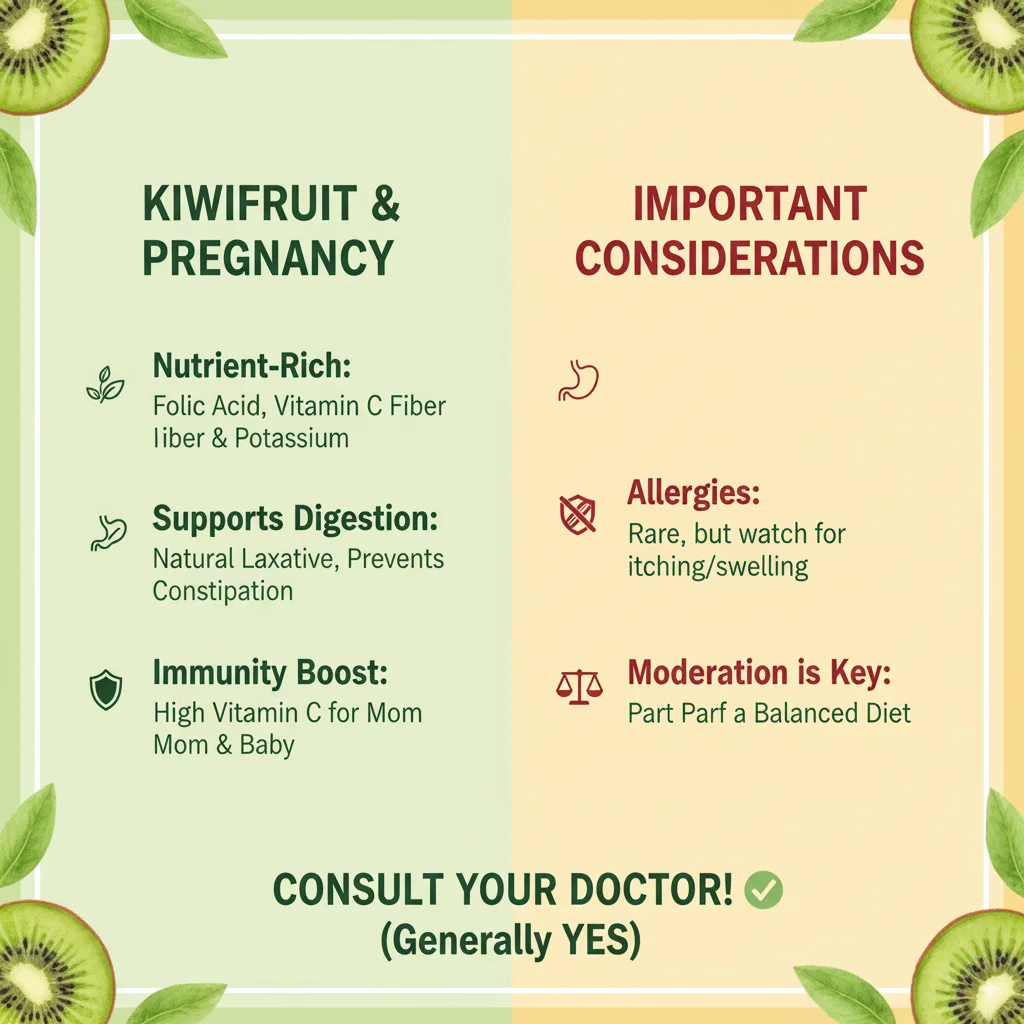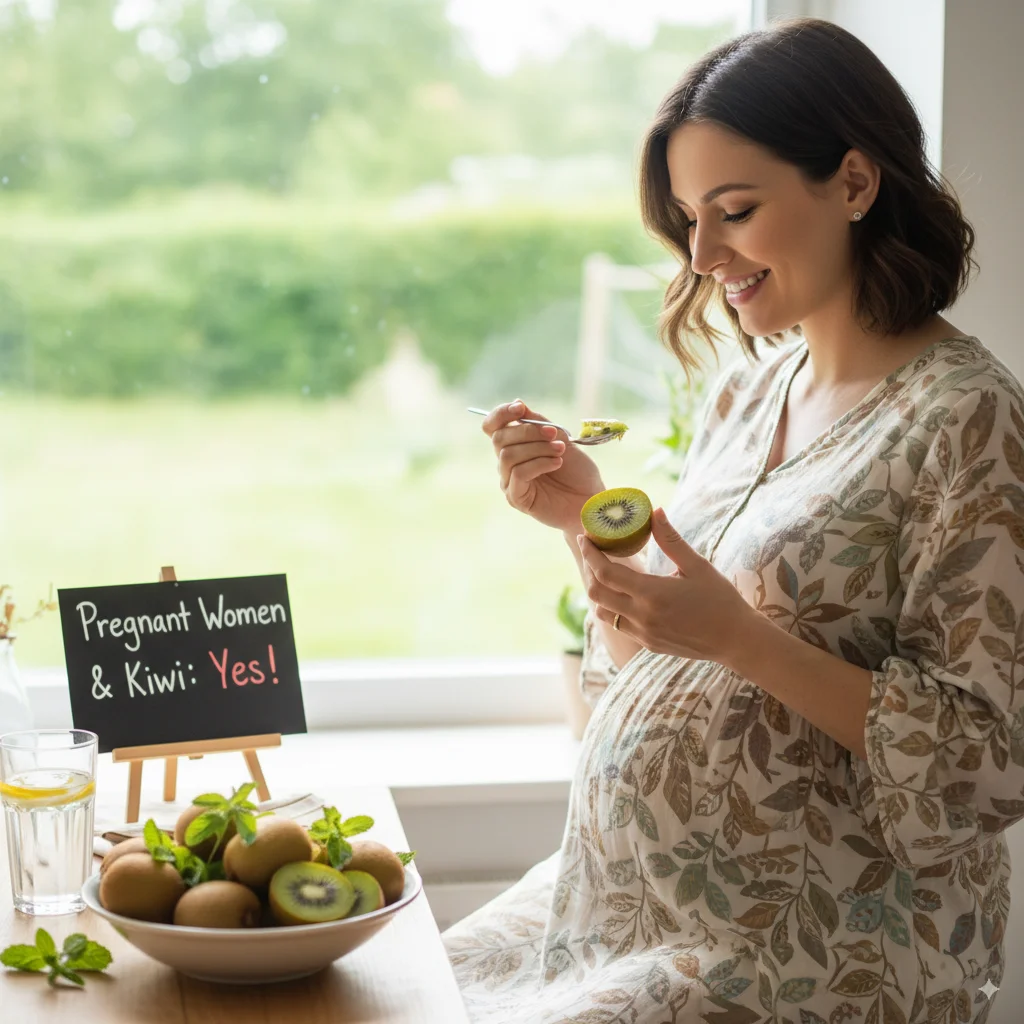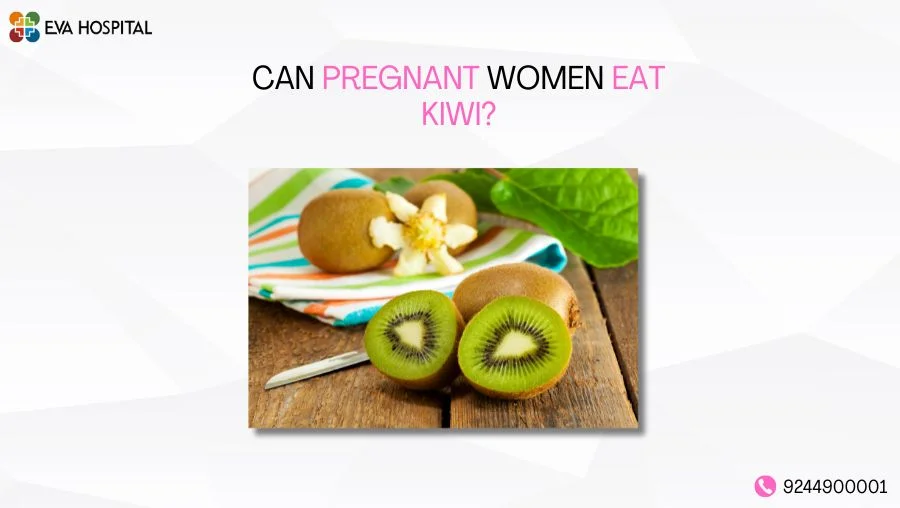Summary
The period of pregnancy is a changing one, full of happiness, expectations, and an endless flow of questions about nutrition and habits. A typical issue is that of fruit intake. Although fruits are mostly healthy, pregnant women would be asking whether certain fruits are safe. A recurring question is: Can pregnant women eat kiwi? The answer is yes. Kiwi is a healthy fruit containing vitamin C, folate, fiber, and antioxidants- all essential in a healthy pregnancy.
However, just like any food, it is important to control. Eating kiwi during pregnancy offers immense benefits, from improving immunity to supporting fetal development. But one cannot overlook allergies and genital sensitivities. This article will discuss the nutritional worth, advantages, potential side effects, how to safely incorporate kiwi into your diet and lots more.
Introduction
Pregnancy leads to an increased sensitivity of food. Pregnant women commonly look to healthy, natural alternatives to keep themselves and their infants nourished. Let’s begin with this interesting topic, hi to all pregnant ladies, Today I Dr. Shivani Bhutani will guide you about the pros and cons of eating Kiwi during pregnancy. I, being the best gynae in Ludhiana, earlier ended the query of my readers regarding ‘Can You Satisfy Your Pizza Craving While Pregnant? and it helped many to end their confusion to eat or not eat pizza. As per my experience, i can say that the Fruits are simple, delicious, and healthy. However, each fruit possesses its own portrait, and not all of them do not cause questions–kiwi being one such fruit.
A small, hairy fruit with a tangy-sweet taste and bright green or golden flesh, the kiwi, aka the Chinese gooseberry, is a small fuzzy fruit. There is a wonderful nutritional profile behind its colourful look. Many ask: Can pregnant women eat kiwi fruit safely? Certainly not, except in cases of allergy or medical complications.
To get in more detail, we will discuss nutrition, health benefits, risks, and tips that expectant mothers can implement.
Can Pregnant Women Eat Kiwi?
The answer to query ‘Can Pregnant Women Eat Kiwi? is yes, it is safe to moderate consumption of kiwi by pregnant women. This fruit is rich in vitamin C, folate, fiber, and antioxidants- all of these are known to promote good pregnancy. Kiwi may be a safe and a health-promoting option when you are pregnant, unless you are allergic to it or have a medical reason that makes you avoid it.
Eating kiwi is not only satisfying to the cravings but also provides nutrients that your body requires most in this period. Numerous females are concerned with acidity/sugar content in fruits, yet kiwi has a low glycemic index and can be relatively gentle to the level of blood sugar. Moreover, it is a good substitute to hefty snacks because of its refreshing taste. It can be safe and enjoyable to include kiwi in your diet, however, you need to consume it wisely.
Why Kiwi is Considered Safe
Kiwi is not listed as one of the restricted fruit during pregnancy. In contrast to papaya (unripe in particular) or pineapple (in large amounts), kiwi does not carry any enzymes or compounds that have been shown to cause uterine contractions or harm. Rather, it is enriched with vitamins, minerals and fiber which promote maternal and fetal wellbeing.
When to Be Cautious
Despite its benefits, kiwi can cause reactions in some women. If you experience mouth irritation, itching, or swelling after eating kiwi, you may be allergic. Those with sensitive stomachs or conditions like acid reflux may also need to limit intake. Consulting your healthcare provider is always wise.
Nutritional Value of Kiwi During Pregnancy
Eating kiwi during pregnancy can give you a wide range of nutrients. This small fruit has a nutritional blow that helps not only the body of the mother but the development of the baby.
Kiwi is distinguished with a rich content of vitamin C and excellent antioxidant properties when compared to other fruits. It has a higher amount of vitamin C when compared to oranges and also gives an ample amount of folate which the initial trimester needs. Kiwi provides a combination of fiber, minerals and hydration making it not only a very good snack but also a total nutritious meal. This is a clever, natural move by kiwi as far as expecting mothers are concerned, to include in the daily meal program.
Key Vitamins in Kiwi
- Vitamin C: Kiwi is among the richest sources of vitamin C, boosting immunity, aiding iron absorption, and supporting collagen production for skin and tissue health.
- Vitamin K: Essential for blood clotting and bone strength.
- Folate: Crucial during the first trimester to prevent neural tube defects and promote healthy brain and spinal cord development.
- Vitamin E: Provides antioxidant protection and supports skin elasticity, which may help reduce stretch marks.
Minerals and Fiber in Kiwi
- Potassium: Helps regulate blood pressure and fluid balance, reducing pregnancy swelling.
- Magnesium: Supports muscle relaxation, reducing cramps and improving sleep quality.
- Calcium (in smaller amounts): Contributes to bone and teeth development in the baby.
- Fiber: Prevents constipation, a common issue during pregnancy due to hormonal changes.
Health Benefits of Kiwi for Pregnant Women
A kiwi fruit can have many benefits to your pregnancy diet. And now we will have a glimpse at some of the most important.
The nutrients of kiwi collaborate to fortify your immune system, to control digestion, as well as to provide energy. In comparison to processed snacks, kiwi is a natural source of sugar without any overload of sugar and other additives. The vitamin and minerals in kiwi can promote energy among the pregnant women who are likely to face fatigue. Incorporating kiwi into your meals is an effort worth taking as not only an indulgence (not to mention the benefits of quenching your sweet craving), but also as a means of benefiting your body and your baby.
Boosts Immunity and Prevents Illness
During pregnancy, immunity of a woman is slightly reduced. Kiwi is rich in vitamin C which boosts the immune system making it hard to contract cold or any infection.
Supports Fetal Development
The kiwi game-changer is folate. Intake of folate is particularly beneficial in early pregnancy because it averts birth defects and aids general development of the fetus.
Nutritional Value of Kiwi (per 100g)
| Nutrient | Amount | Benefits During Pregnancy |
|---|---|---|
| Calories | ~61 kcal | Provides energy without excess weight gain |
| Vitamin C | 92.7 mg | Boosts immunity & aids iron absorption |
| Folate (B9) | 25 µg | Supports fetal brain & spinal cord development |
| Vitamin K | 40 µg | Promotes healthy blood clotting & bone strength |
| Vitamin E | 1.5 mg | Antioxidant protection & skin elasticity |
| Potassium | 312 mg | Regulates blood pressure & reduces swelling |
| Magnesium | 17 mg | Helps reduce muscle cramps & improves sleep |
| Fiber | 3 g | Prevents constipation & supports digestion |
| Calcium | 34 mg | Contributes to strong bones & teeth in the baby |
| Protein | 1.1 g | Aids tissue repair & growth |
Kiwi and Digestive Health in Pregnancy
Digestive problems and constipation are a common pregnancy problem and kiwi can relieve them.
Kiwi has been one of the most acclaimed properties of supporting digestive health on its own. As hormone levels decrease and slows down digestion during pregnancy, the high fiber and natural enzymes present in kiwi can help normalize this. Kiwi should be taken regularly to prevent bloating, constipation and make digestion easy in general. To most expectant mothers it is a reassuring and good fruit to fall back on over the nine months of transformation.

Fiber for Smooth Digestion
The insoluble and soluble fiber of kiwi encourages good digestion, constipation has been prevented and blood sugar regulation has also been achieved.
Enzymes That Aid Digestion
Kiwi has an enzyme, actinidin, which breaks protein and improves digestion. This has the ability to alleviate bloating and post meal heaviness.
Possible Side Effects of Eating Kiwi During Pregnancy
Although there are numerous advantages of kiwi, it might not fit every person.
One should keep in mind that even the healthiest foods may sometimes have a side effect on health conditions that differ in particular cases. Kiwifruits are naturally acidic, which may not sit well with women who are susceptible to heartburn, and their consumption may be overwhelming especially when in excess. With this knowledge of such potential pitfalls, you can experience kiwi without pain. Moderate portions allow the majority of women to enjoy the benefits without any concern of the side effects.
Allergic Reactions
Kiwi is allergenic; it causes allergies, particularly among women who havean allergy towards latex or bananas. Symptoms can be in the form of itching in the mouth, rashes or swelling.
Stomach Discomfort
Consuming excess amounts of kiwi can lead to acidity, diarrhea or abdominal pain, because it contains fiber and is acidic.
How to Eat Kiwi Safely During Pregnancy
Consumption of kiwi can have an impact on the fruit making it beneficial or not.
There are many ways to have kiwi by pregnant women, yet it depends on the way of preparation. Proper washing of the fruit decreases the risk of consuming the residue of pesticides and picking ripe fresh kiwis will guarantee the maximum nutrition. Adding kiwi with other types of fruits can equalize the flavors and avoid excess of acidity. Mindful of the way you prepare it and eat it, kiwi not only makes it very safe, but also a very exciting and diverse add to what you eat.
Best Ways to Include Kiwi in Your Diet
- Fresh as a snack, peeled or eaten with the skin (if thoroughly washed).
- Mixed into smoothies with bananas, berries, or yogurt.
- Tossed into fruit or vegetable salads for tangy flavor.
- Blended into fresh juices (avoid store-bought with added sugars).
Recommended Quantity
One or two medium sized kiwis is considered to be safe. Should you desire more, just speak to your doctor to be sure that it will not irritate the stomach.
Kiwi Recipes for Pregnant Women

Kiwis can be healthy as well as delicious to include in your diet.
Kiwi recipes can add variety to your diet and you should no longer have monotony in food during pregnancy. Kiwi is sweet and savory and goes well in blending it into a smoothie, salads, or yogurt bowls, among other dishes. Not only do these recipes make the act of eating fun, they also enable you to have more nutrients without trying hard. You can make kiwi a normal, enjoyable ingredient of your pregnancy food by testing with basic preparations..
Kiwi Smoothie
Blend kiwi with banana, spinach, and yogurt for a nutrient-dense drink.
Kiwi Salad
Mix kiwi slices with strawberries, mango, and a drizzle of honey for a refreshing salad.
Kiwi Yogurt Bowl
Top Greek yogurt with kiwi slices, oats, and nuts for a protein-rich breakfast.
Can Pregnant Women Eat Kiwi Fruit Daily?
It is safe, yes, to consume kiwi fruit every day in moderation, unless you are allergic or experiencing digestive problems.
Consumption of the kiwi on a daily basis would maintain uniform consumption of vital nutrients particularly vitamin C and folate. But it is better to strike a balance because excess of a certain food type may unbalance digestion or other food types may leave someone in discomfort. The addition of kiwi to additional fruit types such as bananas, apples, and oranges offers diversity and avoids the excess of nutrients. When you eat mindfully, one of the healthiest practices you can practice during pregnancy may be consuming kiwi daily.
Benefits of Daily Consumption
Daily intake ensures consistent vitamin C and folate, supporting immunity and fetal development. It can also help regulate digestion.
When to Limit Kiwi
If you notice acid reflux, allergies, or diarrhea, limit your intake. Always listen to your body’s signals.
Comparing Kiwi with Other Fruits During Pregnancy
What is the comparison between kiwi and other pregnancy friendly fruits?
Most pregnant women have a question on the fruits that are best as far as nutritional value is concerned. Compared to such popular ones as oranges, bananas, and apples, Kiwi competes on its own. The benefits of each fruits differ, but the kiwi fruit is remarkable due to the abundance of antioxidants and folates. Having a combination of fruits helps you not to overlook any essential nutrients, and kiwi can become a highlight in the row of fruits. Such diversity does not only help in enjoying meals, but it also aids in balanced nutrition of you and your baby.
Kiwi vs. Orange
Both are rich in vitamin C, but kiwi has more folate and slightly higher antioxidant content.
Kiwi vs. Banana
Bananas are great for potassium and energy, while kiwi offers more vitamin C and fiber for digestion.
Tips for Buying and Storing Kiwi During Pregnancy
The issue of freshness is important in the case of kiwi.
Selecting the correct kiwi means that you get the most without sacrificing safety. Ripe, high-quality kiwis, without molds or bruises, have to be chosen by pregnant women. Storing would be a significant factor also, such as storing them in the fridge when they are ripe, and the storage can be fresh for days. Through proper purchasing and storing of kiwi, you get to assure yourself that you are enjoying all the nutritious, safe and enjoyable bite with every pregnancy period.
Buying Tips
- Choose kiwis that are firm but slightly soft when pressed.
- Avoid overly mushy or shriveled ones.
Storing Tips
- Keep kiwis at room temperature until ripe.
- Once ripe, refrigerate to prolong freshness for up to a week.
FAQs About Kiwi During Pregnancy
Yes, kiwi at night is safe. Its magnesium content can even elevate the sleeps. Yes, kiwi at night is safe. Its magnesium content can even elevate the sleep.
Yes. Kiwi is particularly good during the first trimester, since it contains folate.
Most women can safely eat one or two medium kiwis each day.
Kiwi does not have any evidence connecting with miscarriage. It is thought to be safe.
Yes, but fresh juice is best. Shun canned juice that is full of additives.
Yes, the low glycemic index of kiwi makes it a good fruit that women with gestational diabetes can have in moderation.
Tangy sweet taste and vitamin c may help minimize nausea in n few women.
Kiwi fruit has a edible skin and is also full of fiber, however, it should be washed before eating.
Conclusion
So, can pregnant women eat kiwi? The answer is a clear yes. And now you may all have got your answers, and I am now signing off will share more related to pregnancy queries in later blogs. Sharing ending points then Kiwi is a vitamin-rich fruit that contains vitamin C, folate, fiber, and antioxidants that are beneficial to maternal health and fetal growth. It is beneficial to the immunity, digestion, and energy, and gives a tasty variety to the food.
Moderation, though, is necessary. Excessive amounts of kiwi can be unpleasant or allergic reaction. As long as there is one to two kiwis per day, the kiwis are a safe and healthy option to most expecting mothers (be it in a smoothie or a salad).
During pregnancy, it is always important to have a word with your healthcare provider to be sure that kiwi fits in your individual food requirements.
















